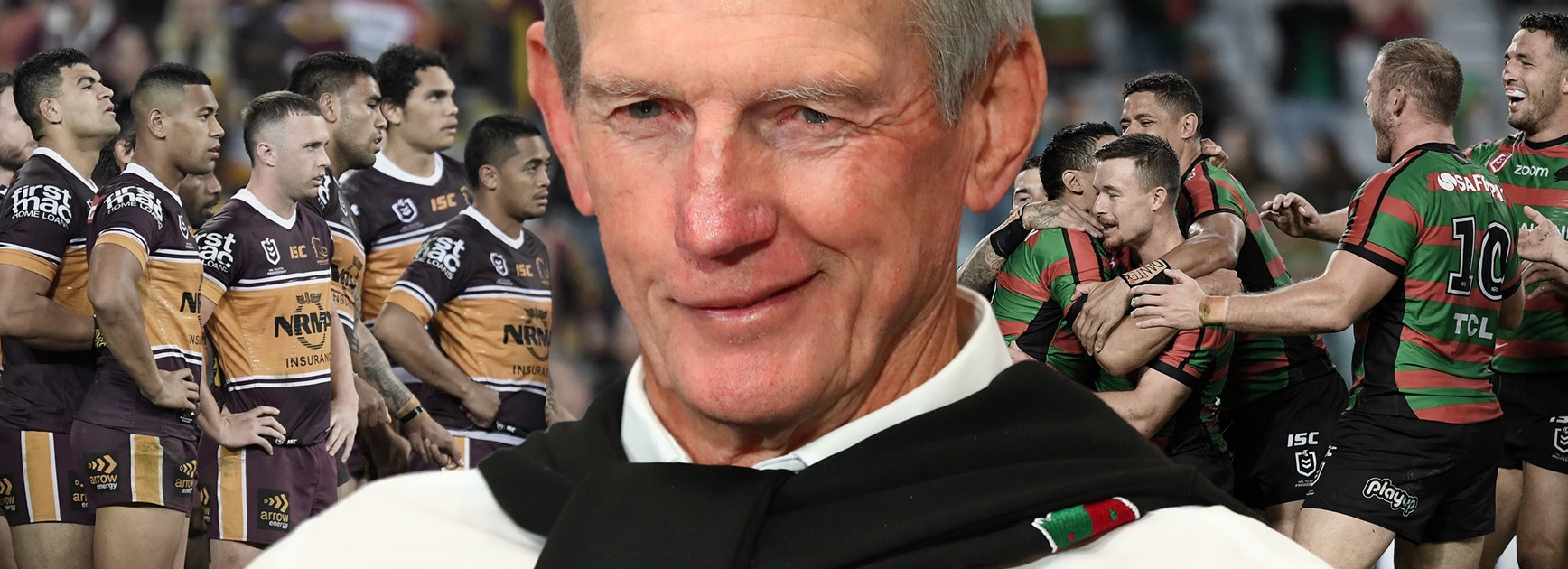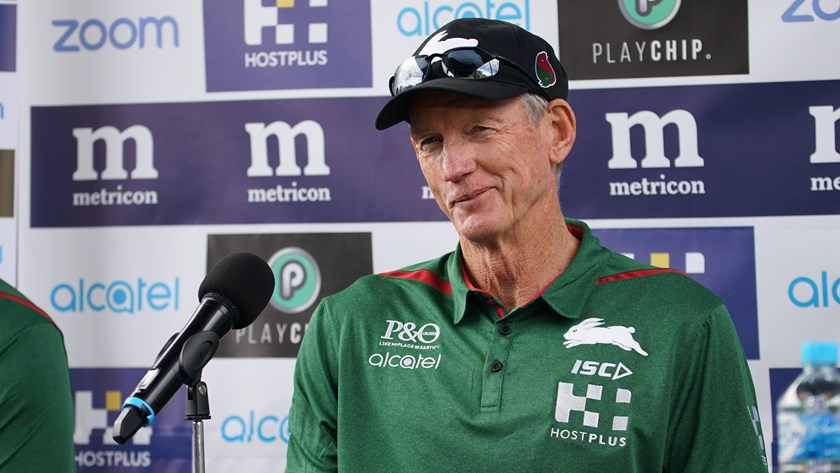
Reviews. They're all the rage at the moment.
Want to sack a coach? Review. Want to move a player on? Review. Season ends horribly? Review.
Wayne Bennett doesn't believe in reviews.
"If I'm waiting until after the season to tell blokes what they're doing wrong, then I'm doing something wrong," he once told his long-time high performance coach Jeremy Hickmans.
Some say it's old school. Others may call it out of touch.
In fact, 12 months earlier, that's exactly what they were calling him. He'd lost it, apparently – whatever 'it' meant. His ability to connect with players, maybe? To coach? The plot, perhaps?
"His fight," Alex McKinnon fires back.
"He lost his fight a bit. But he's got it back again."
Yes, McKinnon knows all about the fight.
After all, it was Bennett – who McKinnon likens to a father – that helped him rediscover his when life changed forever on that fateful day back in 2014.
"When I was at my lowest, coming out of hospital and coming out of rehab, I was in a dark place," McKinnon recalls.
"But he never once stopped treating me like I was before I got injured. He gave me the kick up the arse I needed. He asked me to find actions in my life, not feel sorry for myself thinking 'poor me, why me?'
Wayne is genuinely a players' coach... He's got a real art in making people feel special.
Alex McKinnon
"He asked me to consistently strive for greatness. Never once did he give me an excuse. He would never accept one. Sometimes he knew me better than I knew myself. There's only one Wayne Bennett, that's why he is who he is."
For more than three decades, no one had ever questioned the philosophies and mantra of the master coach.
But in 2018 at the Broncos, that changed. And so did Bennett.
"He wasn't himself last year, he'd admit that now," Hickmans, who followed Bennett from the Broncos to the Dragons, Knights and back, said.
"Everything that was happening, it was causing him issues around his own comfort behaviour.
"That uncertainty, it distracted him. He wasn't communicating around the staff or spending as much time with them as he used to. For as long as I've known him he's always been up front, but he lost that a bit last year."
Another one of Bennett's right hand men for the past two decades, video analyst Scott Barker, has seen first hand over time the coach's ability to distract from distractions. He's the best at it.
But the scrutiny and politics at play at the Broncos last season sent the coach spiralling down a path he'd never travelled before.
"He didn't have that buzz about him," Barker said.
"He's the best at putting aside distractions from the media. But last year he was distracted because it was coming at him from all angles. The communication dropped off after that. He copped a lot of negative criticism for the way things went down last year and he hated that mess as much as the rest of us did.
"He wanted to coach there. He never wanted to leave. None of us wanted to leave there. No one more than him. At the end of the day the thing that drives him is his love to coach. He couldn't just focus on that."
Bennett backs Burgess to speak his mind
Suddenly, his greatest strength had become his biggest weakness.
"You want to know why players love him, why they'd do anything for him?" McKinnon asks.
"Because he wears it all. The scrutiny, the backlash – he takes that. Whether it was his decision or his fault, he puts the player and the team first. Good, bad or indifferent – he absorbs it. He did that last year, that's how much he cared about the Broncos. But the more he did that the worse it got for him."
It was on a training field in Liverpool, England, in November last year, the furthest he could possibly be from the political drama at the Broncos, that things began to change for Bennett.
The smile, it was back.
"We'd just finished training and I went up to him and said 'it's nice to remember what you were like'," Hickmans said.
"He just hadn't enjoyed himself for so long, but having the freedom to just coach, and not worry about all the politics, he was himself again."
Bennett didn't say anything. He just sat there, smiling into the distance.
A coach for the big occasions
Bennett's always treated the regular season as a means to an end. A dress rehearsal for an entirely new competition.
"Always looking at the big picture," Jamie Soward says.
So you could forgive him if he couldn't get up for all of the 839 club games he's coached.
"There were times in round games where Wayne would fall asleep," McKinnon recalled.
"Finals time he's like a kid at Christmas, and there's no bigger kid than Wayne."
The big games. He always gets up for those. Perhaps the best big-game coach of all time.
In the week leading into April 3, 2009 – the first time he would ever coach against the Brisbane Broncos, things changed at the Dragons.
Video sessions were going longer. Intensity at training was amplified. Bennett was a man on a mission.
"I don't know if he'd like me telling you this but we were fighting with him that week to reduce the loads," Hickmans said.
"From a scientific point of view, we wanted him to hold back. But things just kept going that little bit longer and a little bit harder."
Just another game? Don't kid yourself.
You saw how much it means to him a few weeks ago for South Sydney when cameras inside the Suncorp Stadium away sheds captured his post-match celebrations after the defeat of the Broncos.
Bennett explains his celebration dance
"I've never seen that before … I don't think anyone has seen that before," McKinnon said.
"I watch that and I go 'that's pretty special for those players to experience that'. Those guys will cherish that forever. To see the response on the players' face, the bond they have. That's what Wayne does to people.
"He's a players' coach, mate. Some coaches say that's what they are, but they say that in the hope of getting the best out players to win. But Wayne is genuinely a players' coach. You don't learn that in any book you read or course you study. He's got a real art in making people feel special."
And that's exactly what he did for Jamie Soward, tapping into the skill that ultimately ended the Dragons' 31-year premiership drought.
"He never made me feel bad that I wasn't Johnathan Thurston," Soward said.
"I looked forward to review, whether you'd played good or bad. I remember this one week, and I knew I had a bad game, he gave me a rating of five.
"He wrote me this message saying 'I don't know who the imposter in the No.6 jersey is, but when Jamie Soward gets back let me know'. You go out the next week and run through a brick wall for him."
The master man manager
That year, the Dragons went on to play in the grand final. Bennett, a creature of habit, booked them into the Swissotel in Sydney.
The very same same hotel all five of his previous teams stayed in when they qualified and won titles in years gone by.
The morning of the game, clouds rolled over Sydney and the ensuing shower forced Bennett to cancel the traditional pre-game walk.
So they sat. Altogether, talking. "We'll just enjoy each other's company, boys," he said.
So he started a game. Chinese whispers.
"For that moment, it took away the fact that I was this 20-something-year-old kid getting ready for the biggest game of his life," Soward remembered.
"It took away the pressure of the 31-year drought, or wearing the famous No.6 jersey worn by Trent Barrett and Anthony Mundine at one of the most biggest clubs in the country.
"There I was, and all I cared about about was trying to say something funny for Chinese whispers. He just sat there with his legs crossed, smiling as we played. We were his army and he was the king."
Murray: Wayne’s been great for my game.
The master of preparation. Winning before a ball has even been kicked.
Like ordering his troops to pack up and find their own way to Canberra for Friday night's preliminary final against the Raiders in the hope they relax and bond in each other's company on route to the nation's capital.
Bennett's not an emotional type. He's a you-have-to-earn-my-respect-first kind of guy.
And when you think you've got it, he lets you know that you have to work to keep it.
Like how he kept referring to Dan Hunt as Ben Hunt in his first two years at the Dragons. The old wrong name, that's one of his favourites.
Or like the day McKinnon was named to make his debut for St George Illawarra back in 2011, rushed into the 17 after Dan Hunt tore his achilles out the back of WIN Stadium in the warm-up.
"I sat on the bench the whole game, didn't get on," McKinnon said.
"I didn't know it then, but he was never going to play me. He came up to me after the game and said 'you'll earn it one day, today you didn't earn it. We don't give away jerseys here'."
Powerful are his words. Just as powerful are his lack of.
On a night in Newcastle, not long after the club was shattered by the injury to McKinnon, the team was humiliated on home soil.
"That was the first time I ever heard the Newcastle fans turn on us," Barker said.
Bennett trudged into the sheds, his players dejected, and sat on the bench next to them.
For 15 minutes they looked up at the coach, for 15 minutes he just sat there. Not a word uttered, then he stood up and walked out.
"I'll never forget that day. It's one of the most effective post-game sprays I've seen," Hickmans said.
Raiders v Rabbitohs - Preliminary Finals
'He doesn't tell them what they want to hear, but what they need to hear'
In 2016, Adam Blair had suffered a pretty bad cork in his quadriceps and was in doubt for the following game.
All the data and medical science meant the prop was likely to be unavailable the next week.
Then Bennett waltzed into the room. "Blairy, can you squat?" he asked the Kiwi forward.
So he squatted, half squatted at least.
"You're in," Bennett said.
"We were all sitting there wondering should he or shouldn't he," Hickmans said.
"I walked up to Wayne and said 'Are you sure about this?' He said, 'He'll be right, and if he breaks down I'll take responsibility for it – it's my fault'.
"He's a coach with feel. He hasn't survived as long as he has without embracing some of the modern ways. But he's never been one to believe in the technology and the data as the be all and end all. He understands the necessity for it, but he questions the science as well."
He's not one for sitting down and cutting up hours and hours of video, either. He watches at training, he responds immediately.
Bennett doesn't have a cast of thousands working in his coaching staff. Never has. Control freak, maybe?
"He's as far the opposite end to a micro-manager you'll ever meet," Barker said.
Bennett has always believed in the theory that you don't employ people to do a job and them tell them how to do it.
"He told me when I started back in 2001, 'If I'm constantly talking to you, ask yourself what you're doing wrong'," Barker said.
The coach often tells his players that the definition of insanity is doing the same thing without getting any better.
You could argue that was the Dragons for many years before he arrived in 2009.
So after his first game in charge of the joint venture, in which the Dragons had gone down to the Storm in extra time courtesy of a Greg Inglis field goal, he walked into the sheds smiling.
The players, shattered. Bennett, insanely sane.
"I feel sorry for you blokes," he told his players.
"I feel sorry for you because that's the standard you've now set yourself after one game."
Bennett doesn't care about the two points. It's always about the long game.
It's why he was never fazed by South Sydney's up-and-down form in 2019. It only matters what happens in September and beyond.
"There's definitely more calmness around the playing group these days," Rabbitohs football manager Mark Ellison said.
"When they go out to play they aren't uptight. In the past without Greg Inglis we've struggled. Wayne's taught them how to play without him, to believe without him.
"You can't rely on other people, just rely on yourself to put it all together. He just gets the best out of people. He doesn't tell them what they want to hear, but what they need to hear."

Bennett's greatest achievement
Inside the sheds at Kogarah eight years ago, a Vanuatu cricket coach on a study tour to Australia spent some time with Bennett after one of the Dragons' victories.
He asked him "when are you going to retire?"
Bennett, a self-professed man with no hobbies, made reference to a College Football coach in the United States still going into his 80s.
"I'm aiming to beat that," he fired back.
There isn't anything in rugby league Bennett hasn't done as a coach, but his motivation in 2019 is arguably as high as it's ever been.
Perhaps a premiership with South Sydney, 12 months after he was made to feel like he was closer to a nursing home than another title, would be the greatest accomplishment of his career?
"No. His greatest achievement has nothing to do with wins mate," Hickmans replies.
"His greatest achievement will always be how he kept Newcastle – the players, the staff, the town – together during the Alex McKinnon tragedy."
Not many people have seen Bennett shed tears. McKinnon saw a side to the coach few have witnessed as he struggled to contain his emotions through the ordeal.
"He's a very, very, very special person," McKinnon said.
"A lot of my actions are influenced by not wanting to do him wrong. Footy is important and it brings people together. That's his life. But it also brings people together. Being able to have that depth in relationship when you face challenges – that's Wayne's greatest quality.
"You talk to anybody at the Knights at the time – the amount of effort and emotional stress it put on him at a time that he himself wasn't in a good state of mind, to not think of himself and instead worry about others and keeping them together – it's why we all love him."
Soward sums it up best, reflecting on the moment that he shared with his mentor the moment the Dragons finally ended the curse back in 2010.
"It's like running into your dad's arms when you know you've made him the proudest he can be," Soward said.
"When he gives you that smile and hug it's like 'f**** hell, I've made it. I belong here.'"





